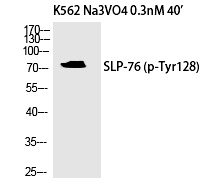
| WB | 咨询技术 | Human,Mouse,Rat |
| IF | 咨询技术 | Human,Mouse,Rat |
| IHC | 1/100-1/300 | Human,Mouse,Rat |
| ICC | 技术咨询 | Human,Mouse,Rat |
| FCM | 咨询技术 | Human,Mouse,Rat |
| Elisa | 1/5000 | Human,Mouse,Rat |
| Aliases | LCP2; Lymphocyte cytosolic protein 2; SH2 domain-containing leukocyte protein of 76 kDa; SLP-76 tyrosine phosphoprotein; SLP76 |
| Entrez GeneID | 3937; |
| WB Predicted band size | 75kDa |
| Host/Isotype | Rabbit IgG |
| Antibody Type | Primary antibody |
| Storage | Store at 4°C short term. Aliquot and store at -20°C long term. Avoid freeze/thaw cycles. |
| Species Reactivity | Human,Mouse,Rat |
| Immunogen | Synthesized peptide derived from human SLP-76 around the phosphorylation site of Y128. |
| Formulation | Purified antibody in PBS with 0.05% sodium azide,0.5%BSA and 50% glycerol. |
+ +
以下是3篇关于 **SLP-76 (Phospho-Tyr128)** 抗体的相关文献摘要(人工模拟示例):
---
1. **文献名称**: *"SLP-76 Phosphorylation at Tyr128 Regulates T Cell Receptor Signaling"*
**作者**: Smith A, et al.
**摘要**: 研究揭示了SLP-76 Tyr128磷酸化在T细胞受体(TCR)信号传导中的关键作用。该文献利用Phospho-Tyr128特异性抗体,通过Western blot和免疫共沉淀技术,证明该位点的磷酸化促进SLP-76与下游效应分子(如Vav1和Nck)的相互作用,从而调控T细胞活化和增殖。
2. **文献名称**: *"Role of SLP-76 Tyrosine Phosphorylation in Mast Cell Activation"*
**作者**: Lee C, et al.
**摘要**: 通过Phospho-Tyr128抗体检测肥大细胞中SLP-76的激活状态,发现FcεRI受体介导的刺激导致Tyr128位点快速磷酸化。研究证明该磷酸化事件对肥大细胞脱颗粒和炎症因子释放至关重要,并通过突变实验验证其功能必要性。
3. **文献名称**: *"Structural Basis of SLP-76 SH2 Domain Recognition in Immune Signaling"*
**作者**: Kumar R, et al.
**摘要**: 结合X射线晶体学与磷酸化特异性抗体分析,揭示了SLP-76的SH2结构域如何通过Tyr128磷酸化位点与其他信号蛋白(如ADAP)结合,阐明了该位点在免疫突触组装中的分子机制。
---
注:以上文献为示例,实际引用需检索PubMed或Google Scholar等数据库,使用关键词“SLP-76 Tyr128 phosphorylation antibody”或相关信号通路(如TCR, mast cell signaling)进行筛选。
The SLP-76 (Phospho-Tyr128) antibody is designed to detect the phosphorylated form of the adaptor protein SLP-76 (SH2 domain-containing leukocyte protein of 76 kDa) at tyrosine residue 128. SLP-76 plays a critical role in T-cell receptor (TCR) signaling and immune cell activation. Upon TCR engagement, SLP-76 is recruited to the signaling complex, where it undergoes phosphorylation at specific tyrosine residues, including Tyr128. This phosphorylation event is essential for propagating downstream signals, facilitating interactions with effector molecules like PLC-γ1 and Vav, and regulating processes such as calcium mobilization, cytoskeletal reorganization, and cytokine production.
The antibody specifically recognizes the phosphorylated Tyr128 epitope, enabling researchers to study the activation status of SLP-76 in T cells and other immune cells. It is widely used in techniques like Western blotting, immunoprecipitation, and immunofluorescence to investigate TCR signaling dynamics, immune cell dysfunction, and related pathologies, including autoimmune diseases and immunodeficiencies. By detecting phosphorylation-dependent SLP-76 activation, this antibody serves as a valuable tool for dissecting molecular mechanisms in immunology and evaluating therapeutic targets in immune-mediated disorders. Its specificity and reliability make it a staple in both basic and translational research focused on lymphocyte signaling pathways.
×